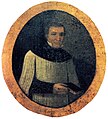Polyglot people
Polyglott ( adjective , from ancient Greek πολύγλωττος ( polýglōttos ) for multilingual , which in turn goes back to πολυ ( poly ) for much and γλῶττα ( glōtta ) for tongue, language ) is a person who speaks many languages (also multilingual , multilingual ). It is not defined how many languages one has to be able to speak and how well in order to be called polyglot , nor is the degree of active and passive command of a language objectively defined. Many of these points are also addressed in the article on multilingualism .
Well-known polyglot people
The epitome of a polyglot are the English political economist, traveler and writer Sir John Bowring (1792–1872), who according to his own account knew over 200 languages and spoke over 100 of them, the German diplomat Emil Krebs (1867–1930), 68 Languages spoken and written "mastered", as well as the Italian Cardinal Giuseppe Mezzofanti (1774–1849), who never left Italy but spoke 38 languages and knew 50 dialects from different languages.
A living polyglot is the Greek Ioannis Ikonomou , who speaks over 30 languages and works as a translator for the European Commission in Brussels.
Researchers led by Michael Chee from the Cognitive Neuroscience Laboratory in Singapore have found that people who learn a foreign language easily use the region of their brain known as the insula more intensively, because unusual sound patterns are unconsciously stored in this region.
Sir John Bowring
See also
literature
- Michael Erard: Babel No More: The Search for the World's Most Extraordinary Language Learners. Free Press, New York 2012, ISBN 978-1-4516-2825-8 .
- Peter Hahn (Ed.): Emil Krebs - Kurier des Geistes , with contributions by Harald Braun (foreword), Katrin Amunts, Otto Julius Bierbaum , Peter Hahn, Gunnar Hille, Eckhard Hoffmann, Antonio Reda, Hans-Ulrich Seidt and Jürgen Stich, Oase Verlag, Badenweiler 2011, ISBN 978-3-88922-097-4 .
Web links
- Birgit Buchroithner: Puzzling language geniuses ; Image of Science, March 7, 2005
- Christian Lehmann: polyglossy
- international meeting of polyglots (English, Esperanto, Slovak)
Individual evidence
- ^ John Simpson and Edmund Weiner: The Oxford English Dictionary , Second Edition . Oxford University Press , Oxford 1989, ISBN 978-0-19-861186-8 . Article on polyglot
- ^ Entry in the database of the official website of the Duden on polyglot ; see: duden.de
- ^ Christian Lehmann: Polyglossy [1]
- ↑ Cecile and Oskar Vogt Archive, Düsseldorf, Interview with Dr. Zwirner / Mande Krebs in the brain research center Berlin-Buch 1930; Obituary Prof. Dr. Eduard Erkes, Litterae Orientales 1931, pp. 13 and 14.
- ↑ European Commission: Frequently Asked Questions: Multilingualism and Language Learning September 25, 2012 [2]









